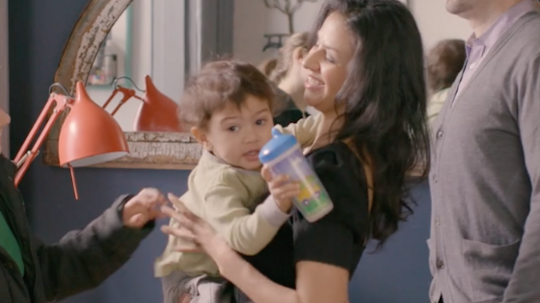
Finding a trustworthy, reliable and also affordable babysitter can be a real challenge in a town like D.C., where housing is getting more expensive, parking is a struggle and free time is lacking. The 21st century solution, as it has been so many times before in recent years, may be an app. At least that's what Chime, a subsidiary of Chicago-based babysitter listing website Sittercity, hopes.
Chime offers what can be basically described as Uber for babysitting via an app and website.
By tapping into the Chime app, a user can search through a number of available sitters who have been vetted and personally interviewed by the company. After selecting an individual, a scheduling tool will allow for a convenient avenue to set up a visit ahead of time. The eventual result is a stranger knocking on your door and watching your kids for an hourly rate of $15 in D.C., $16 in Boston, $17 in New York and $14 in Chicago.
Similar to Uber, those babysitters are considered contractors. And the business model is based on a percentage take per job on the total spend. For Chime, the percentage is 10 percent.
D.C. represents the third city where Chime has expanded into after originally launching in Chicago about 18 months ago.
The service launched in D.C. in October. Early traction has been positive.
I spoke with Andrew Conrad, Sittercity's VP of Operations and Strategy, about the sort of progress his business has made in D.C, the structure behind Chime and how the still-young company is overcoming certain stigmas attached to their market.
Conrad explained that Chime is "definitely a business that has benefited from the trailblazing of others." He specifically noted the rise of ride hailing app Uber and on-demand residential real estate renting service Airbnb in a phone interview.
"Businesses like Airbnb have raised expectations for both customers and service providers to deliver high quality, highly reliable service, and simplified payments along with a myriad of other bells and whistles. Now, parents just expect to be able to use an app to book, manage, and pay their favorite caregiver"
The service has proven especially popular in several key D.C. neighborhoods, including Capitol Hill, Columbia Heights, Sixteenth Street Heights and Petworth, according to Conrad.
The commonality between these different neighborhoods, he explained, is the prevalence of dual-income professional families—which in addition to SitterCity's market penetration, is Chime's most influential identifier to determine expansion markets.
Conrad declined to discuss specific revenue figures, customer count or available sitters per region. "That's not something we disclose."
He added, however, that Chime has been growing rapidly since launching in October. "Within our first four markets, our goal is to expand our footprint to all neighborhoods and key suburbs where parent demand is high," said Conrad.
The D.C.-area, which encompasses D.C. and Northern Virginia for Chime, has generated in the the "low double digits [thousands of dollars]" of revenue to date.
Naturally, Chime understands that many parents, today, are hesitant to use a service that pairs their child with what is essentially a random person. Many of Chime's customers, Conrad described, have previously used the internet in some capacity to consider the hiring of a sitter—either via SitterCity or another competing service. These are early adopters in the truest sense of the word.
The customer overlap between SitterCity, which provides a database of verified sitters to choose from, and Chime is significant. The greatest difference between the two is how Chime automates the process and SitterCity brings lists that require some manual review. To be clear: each platform is a separate entity though users can share a login.
SitterCity boasts 5 million registered sitters across the U.S. Some of which are also on Chime.
Generally speaking, Conrad said that customers of Chime tend to be between the ages of 30 and 45 with two children. The sitters are usually young professionals in their early to mid twenties and operate on multiple income streams.
The vetting process for sitters begins with multiple background checks, including a scan for criminal and county of residence records. Conrad told DC Inno, "our in-person meetings ensure sitters are great sitters, along with being reliable and professional. We have also introduced social screening for caregivers and parents as further assurance. Additionally, we are piloting fingerprint-based background checks (Chicago initially, with other markets to follow) as just one more safe-guard."




